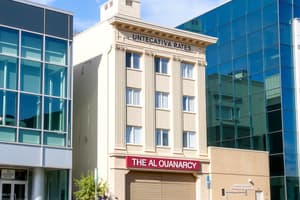Podcast
Questions and Answers
What is the Units of Production method used for?
What is the Units of Production method used for?
- To ignore the cost of a non-current asset
- To calculate the total production units of a non-current asset
- To spread out the cost of a non-current asset over its useful life based on its use (correct)
- To calculate the total cost of a non-current asset
What is the end-of-year basis for calculating depreciation provisions?
What is the end-of-year basis for calculating depreciation provisions?
- We calculate depreciation on a monthly basis
- We calculate a full period’s depreciation on the assets in use at the start of the period
- We calculate a full period’s depreciation on the assets in use at the end of the period (correct)
- We ignore the dates during the year when the assets were bought or sold
How is the provision for depreciation made on a month-to-month basis?
How is the provision for depreciation made on a month-to-month basis?
- One year's ownership, one year's provision
- One day's ownership, one day's provision
- One week's ownership, one week's provision
- One month's ownership, one month's provision (correct)
What types of accounts are maintained when recording depreciation in the books of accounts?
What types of accounts are maintained when recording depreciation in the books of accounts?
What is depreciation?
What is depreciation?
What are non-current assets?
What are non-current assets?
What is the purpose of recording depreciation in the books of accounts?
What is the purpose of recording depreciation in the books of accounts?
What are the three methods of calculating and recording depreciation?
What are the three methods of calculating and recording depreciation?
What is the net asset value of an asset?
What is the net asset value of an asset?
What is revenue expenditure?
What is revenue expenditure?
What is capital expenditure?
What is capital expenditure?
What are the three factors that determine the rate of depreciation?
What are the three factors that determine the rate of depreciation?
What is the straight-line method of depreciation?
What is the straight-line method of depreciation?
What is the reducing balance method of depreciation?
What is the reducing balance method of depreciation?
What is the accounting concept that states that only activities that can be measured in terms of money should be recorded in the accounting books?
What is the accounting concept that states that only activities that can be measured in terms of money should be recorded in the accounting books?
What is the accounting concept that stipulates that all assets must be recorded at the 'original cost' and not the assets' current market value?
What is the accounting concept that stipulates that all assets must be recorded at the 'original cost' and not the assets' current market value?
What is the accounting concept that means that it is quantifiable and can easily be measured, making it more agreeable to different parties?
What is the accounting concept that means that it is quantifiable and can easily be measured, making it more agreeable to different parties?
Flashcards are hidden until you start studying
Study Notes
Depreciation
- Depreciation is the systematic allocation of the cost of a tangible non-current asset over its useful life.
- Depreciation is an accounting method used to reflect the decrease in value of an asset over its useful life.
- It is an expense, not a valuation.
- Non-current assets are assets that a business intends to hold for more than one year.
- Revenue expenditure is expenditure incurred on the day to day running of a business.
- Capital expenditure is expenditure that is incurred when purchasing new assets.
- Net asset value of an asset is the cost of the asset less the accumulated depreciation on that asset.
Accounting Concept
- Objectivity, which states that only activities that can be measured in terms of money should be recorded in the accounting books.
- Historical cost, which stipulates that all assets must be recorded at the ‘original cost’ and not the assets' current market value.
- Measurability, which means that items should be quantifiable and can easily be measured.
Methods of Calculating Depreciation
- Straight-line method is a method of allocating the cost of an asset evenly over its useful life.
- The reducing balance method is a method of allocating the cost of an asset at a decreasing rate over its useful life.
Recording Depreciation
- The Units of Production method allocates the cost of an asset based on the number of units produced.
- End-of-year basis for calculating depreciation provisions is calculated at the end of the financial year.
- Month-to-month basis provision for depreciation is calculated over the course of the month.
- The following types of accounts are used when recording depreciation:
- Depreciation expense account: This account is credited to record depreciation expense.
- Accumulated depreciation account: This account is debited to record the accumulated depreciation.
Factors Determining Depreciation Rate
- The three factors that determine the rate of depreciation are:
- The cost of the asset
- The estimated useful life of the asset
- The estimated residual value of the asset.
Studying That Suits You
Use AI to generate personalized quizzes and flashcards to suit your learning preferences.





